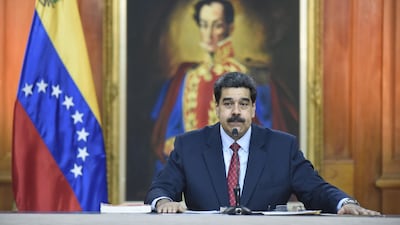Arabs should readily recognise much of the drama now unfolding in Venezuela, no matter how geographically and culturally distant it may seem.
On Wednesday, legislative leader Juan Guaido declared himself president, instead of Nicolas Maduro, the hand-picked successor of the late president Hugo Chavez.
Most key western hemisphere states, including the United States, Canada, Brazil and Argentina have recognised Mr Guaido, because the election recently won by Mr Maduro was plainly fraudulent.
However, Mexico, Cuba and other regional leftist governments continue to stand behind Mr Maduro. More importantly, the Venezuelan military shows few signs of abandoning him either.
Venezuela’s role as a major oil exporter is just the start of it. The bane of the contemporary Arab world is state failure, especially in countries shaken by the Arab Spring uprisings, and space for non-state and terrorist groups remains all-too common throughout the region.
Venezuelan misrule under Chavez and Mr Maduro has many echoes of the crisis of the Arab state. Not surprisingly, the Venezuelan regime is a close ally of Iran and Bashar Al Assad in Syria. It also never wavered in its backing of Muammar Gaddafi in Libya.
So far, Venezuela has been able to avoid the bloodshed that laid waste to Syria, Iraq, Libya and other Arab states.
However, the tragedy of Venezuela centres on the political corruption or replacement of national institutions by a ruthless and self-serving new political class, who hoarded power, and then money, for themselves and their cronies. By now they have managed to plunder the entire country.
It’s a stunning national collapse.
In the 1970s and 1980s, Venezuela's oil wealth, relative sophistication and dysfunctional but tolerant democracy made it the wealthiest South American country per capita, and one of the more advanced in the developing world.
But the traditional Venezuelan elite squandered popular support through endless petty infighting, government deadlock and indifference to vast and unacceptable social, economic and ethnic inequalities amid the nation’s growing prosperity.
These conditions presented the perfect opportunity for a demagogue.
After Chavez came to power as a populist outsider, a new political elite centred around him systematically ransacked a national economy more dependent on petroleum exports than any Arab state.
In the name of the poor, institutions such as the state oil company were looted and used mainly for political patronage.
Venezuelans rely heavily on access to foreign currency. But Chavez restricted access to extremely low official exchange rates to a favoured few, while an enormous, murky and immensely costly black market developed for US dollars. That deliberately created, in effect, two currencies, one for the regime and its cronies and another for everyone else. Regime insiders have exploited this two-tiered system to, almost literally, wrench every crumb from ordinary people on an endless and daily basis.
As long as oil was highly priced, they were just about getting away with it.
But under Mr Maduro, the Venezuelan kleptocracy gambled that oil would keep rising to about $200 a barrel. Now, however, prices stand at around $53.
Added to all of that is a tightly controlled marketplace with absurdly low, government-mandated prices for basic goods, and many other disincentives for local production.
It's a recipe for economic collapse and the worst hyperinflation in modern history, which Venezuela is experiencing.
No Arab country has mirrored this precise scenario, but most of these elements have cropped up in various parts of the Arab world in recent decades.
Venezuela's experiment with dismantling existing institutional structures and replacing them with new ones that are strictly subservient to a new, narrow political leadership – all in the name of the nation and the people – is starkly reminiscent of many Arab republics, including Nasserite Egypt and Baathist Syria and Iraq.
Disastrous consequences follow inevitably from such folly and mendacity, both here and there.
The one thing mercifully missing in Venezuela so far is a major outbreak of terrorism, or ethnic or sectarian conflict. However, there is a nefarious foreign power involved: Cuba.
In a depressingly familiar blunder, the new Venezuelan political elite have outsourced much of their most important decision-making to Cuba, with the bizarre consequence that the weaker and poorer of these partners has control bordering on hegemony over the other
Today, Venezuela stands on a precipice.
It will either begin to reconstruct itself with the help of regional and international powers, or it will stick with Cuba and continue to devour itself, driving millions more impoverished refugees into the same neighbouring states that once supplied Venezuela's cheapest labour.
The most disturbing scenario, of course, is that the military and police could split, starting a protracted battle for power.
Much of the military is close to the population. The rank and file, and the middle levels must, like their families, be desperate for change.
However, senior military officers and institutions are deeply implicated in organised criminal activities, especially vast drug-running enterprises, and may fear exposure and punishment, or even just the loss of their lucrative rackets, if they turn on their civilian partners.
A Venezuelan ISIS is unlikely to emerge, but a conflict between regime loyalists and disaffected groups is alarmingly plausible and may soon become unavoidable.
The countries recognising Mr Guaido are correctly encouraging Venezuela – and especially its military – to avoid such a catastrophe. Recent Arab experiences confirm that, for all their suffering, Venezuelans have yet to experience the cruellest scenarios that heinous misgovernment can inflict.
Hussein Ibish is a senior resident scholar at the Arab Gulf States Institute in Washington


